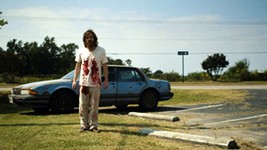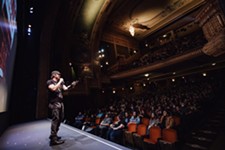'Narco Cultura' Sings a Song of the Drug War
Director Shaul Schwarz explores the balladeers of crime
By Richard Whittaker, 12:45PM, Mon. Sep. 23, 2013

There's a pivotal image in Narco Cultura: A dotted line drawn on the screen between El Paso and Juarez. Director Shaul Schwarz said, "Americans tend to call this the Mexican drug war, and place it very far away from us. But we're all part of the same cycle."
Similarly, Schwarz's documentary straddles the border. In el norte, he follows Edgar Quintero, singer with BuKnas de Cuilican, an American outfit that plays narcocorrida: Hagiographic ballads about the exploits and real crimes of the Mexican drug cartels. In Mexico, he shadows Rich Soto, a crime scene investigator in Juarez. One man glamorizes the violence through songs commissioned by the criminals: The other has to deal with it on a daily basis. A photo-journalist by trade, Schwarz uses their first person experiences to explore not just the drug war, but the impact it has on the culture on both sides of the border. He said, "We've seen really good films with talking heads, but we'd never seen it done really through a verite story, getting in the thick of things."
Austin Chronicle: How did you pick the narcocorrida as a way to discuss how the cartel wars are affecting culture?
Shaul Schwarz: I started covering this as a photojournalist. As I really moved forward, I didn't want more photos of the violence. I started understanding the toll is bigger than cartels killing cartels. It's really how the gangsters have an affect on the youth and the culture, and how it affects millions of people. Through that, I started doing more of the cultural side, and I thought the best way was through the music.
I personally discovered it back in 2010. I'd read about it for a long time, but one day I was shooting in Tijuana and that night I made an appointment to meet BuKnas for the first time. I woke up in Tijuana covering some of the violence, saw two crime scenes, and a couple of hours later I crossed the border. An hour later I was at their show and I was stunned. My jaw dropped at how different and how bizarre this juxtaposition is. And once that hit me, I knew I couldn't tell that story in pictures and I really wanted to tell that story in film.
A lot changed in the three years of filming it, but the same kind of feeling I had that day is what I wanted to say in the film, to take you back and forth through this glorification through culture and how shockingly different it is, although it's all so close and all part of the same thing.
AC: There's a strange reversal. You have a singer who serenades gangsters, and he's a public figure, but it's the crime scene investigators who have to go masked. How did you get them to talk openly?
SS: I was getting good access to the story from the get-go and putting myself in the thick of things in Juarez. As I spent more time and kept going to these places, I did earn their respect, whether with local people or journalists or even the musicians. They started seeing me come back again and again, rather than the quick hit that some journalists do. That started leading me so deep in. At some point I just got used to it. It seemed normal to me.
The flipside is that we would saw a lot more than we could shoot. It was one of these issues we're we'd go, oh, we're invited to this party, and this and this is happening. It became frustrating that we knew so much and saw so much, and we just had to fit in with the camera and show just enough to be able to expose it. Walking that narrow line without making people feel uncomfortable or like they're putting their life on the line.
I feel it worked out. The people really react to it. I remember when we were editing, being disappointed that we saw and knew so much more. We were like, 'I can't believe we didn't get this.' (Lars Knudsen) my producer said, 'It's OK, I think you got enough.' I think we lost track of how deep we were able to get in, considering how sensitive this story is. It wasn't until we started screening it at festivals that everybody would ask, 'how did people let you film them, how did they let you in?' that I realized that we were able to penetrate deep enough and get enough on film.
AC: So whose confidence was it harder to get: The singers, the gangsters, or the cops?
SS: Inside Richie's CSI unit in Juarez, it was initially a bit of a bumpy ride as the head of the SEMEFO (Servicio Médico Forense) got charged with being part of the Sinaloa Cartel and got overthrown. Even before that there was always a little bit of bump. But we connected with Richie and we stayed very true on not getting very deep into a particular investigation. I think that was the key to keep our access and to keep everybody safe. We weren't going in there trying to solve an individual murder or how the drugs moved. I was looking at the bigger picture.
Once I established the special contact and the trust with the unit and with the Juarez cops, and the spokespeople who let me have the special access, I really respected what I needed to do there.
In terms of how we were talking to the cartels or the police, I'm not sure that's always completely different. In fact, always working through authorities, we suspected and almost knew for sure that these organizations, including the unit we were working with, are highly corrupted by different cartel people. You don't know who is who, and who to trust. One is always very careful within that space. Yet again, we understood that we're not going to investigate anything in particular, we're just going to to the bigger picture, and we were very careful of what to do and what to say next to these people.
Fantastic Fest presents Narco Cultura, Tuesday, Sept. 24, 2.30pm.
A note to readers: Bold and uncensored, The Austin Chronicle has been Austin’s independent news source for over 40 years, expressing the community’s political and environmental concerns and supporting its active cultural scene. Now more than ever, we need your support to continue supplying Austin with independent, free press. If real news is important to you, please consider making a donation of $5, $10 or whatever you can afford, to help keep our journalism on stands.
Richard Whittaker, July 31, 2018
Richard Whittaker, April 20, 2018
Richard Whittaker, April 24, 2014
Richard Whittaker, Jan. 5, 2014
April 12, 2024
April 11, 2024
Fantastic Fest, Fantastic Fest 2013, Alamo Drafthouse, Alamo Lakeline, Narco Cultura, Narcocorrida, Juarez, Drug War, Sinaloa Cartel, BuKnas de Culiacan, SeMeFo












